英文文献综述样本 威尼斯商人
威尼斯商人-英语版
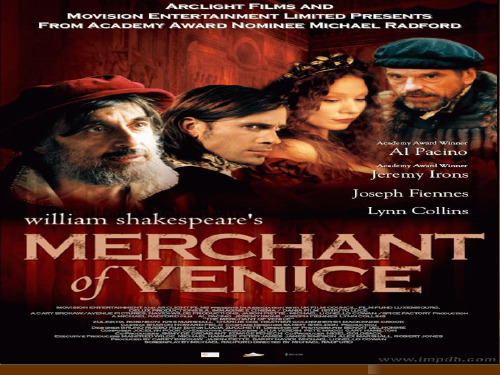
plot
In 1596, in the liberal Venice, Bassanio asks for a large amount to his friend, the merchant Antonio, to travel to Belmont (贝尔蒙特, 美国)and propose the gorgeous Portia
Antonio – a merchant of Venice Bassanio – Antonio‘s friend; suitor(求婚者) to Portia Portia – a rich heiress Shylock – a rich Jew, moneylender, father of Jessica Jessica – daughter of Shylock, Lorenzo's girlfriend Lorenzo – friend of Antonio and Bassanio, in love with
《威尼斯商人》 是莎士比亚早期的重要作品,是一部具有极大讽刺性的喜剧 。大约作于1596~1597年。
Play praises of love, friendship and love, but also reflects the early commercial capitalism, the contradiction between the bourgeoisie and the usurer, the performance of the author of bourgeois society, money, legal and religious issues of Humanism. This plays an important literary achievement, the mercenary is shaped Shylock, the typical image of a ruthless loan shark.
文献综述首页格式
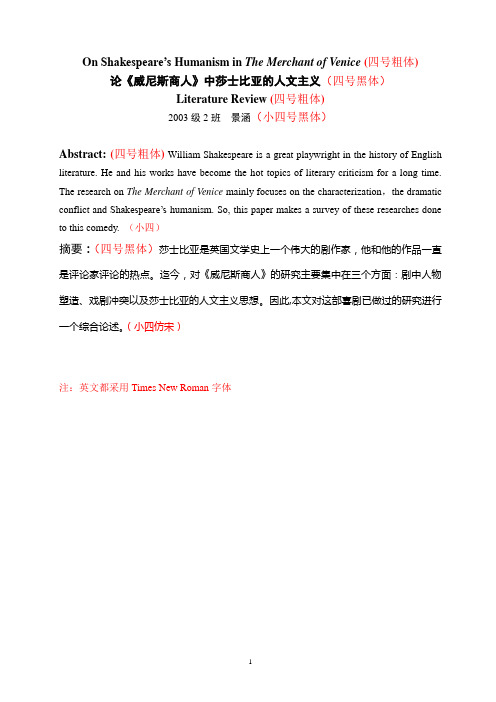
On Shakespeare’s Humanism in The Merchant of V enice (四号粗体)论《威尼斯商人》中莎士比亚的人文主义(四号黑体)
Literature Review (四号粗体)
2003级2班景涵(小四号黑体)
Abstract: (四号粗体) William Shakespeare is a great playwright in the history of English literature. He and his works have become the hot topics of literary criticism for a long time. The research on The Merchant of Venice mainly focuses on the characterization,the dramatic conflict and Shakespeare’s humanism. So, this paper makes a survey of these researches done to this comedy. (小四)
摘要:(四号黑体)莎士比亚是英国文学史上一个伟大的剧作家,他和他的作品一直是评论家评论的热点。
迄今,对《威尼斯商人》的研究主要集中在三个方面:剧中人物塑造、戏剧冲突以及莎士比亚的人文主义思想。
因此,本文对这部喜剧已做过的研究进行一个综合论述。
(小四仿宋)
注:英文都采用Times New Roman字体
1。
威尼斯商人 英语版
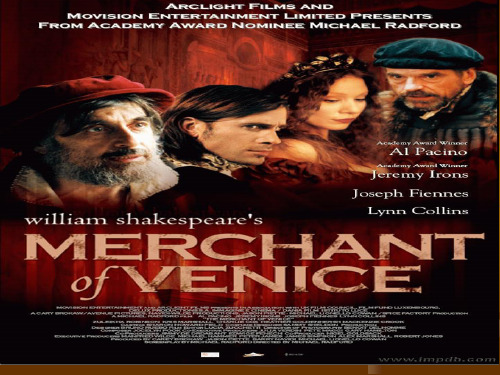
剧本歌颂仁爱、友谊和爱情,同时也反映了资本主义早期商业资产阶级与高 利贷者之间的矛盾,表现了作者对资产阶级社会中金钱、法律和宗教等问题 的人文主义思想。这部剧作的一个重要文学成就,就是塑造了夏洛克这一惟 利是图、冷酷无情的高利贷者的典型形象。
The main characters
Main characters:
When Shylock’s daughter Jessica runaway from home with all his money and jewels, he becomes furious(狂怒的). Meanwhile, the load of Antonio sinks with three different vessels(船只) and he is not able to pay his debts with Shylock, and the Jew goes to court of Venice claiming the execution(实施) of his deal.
莎士比亚(英国) 1564—1616年
简介:
The Merchant of Venice is the important early works of Shakespeare,is a comedy with a great satirical 。It’s about to make in 1596 ~ 1597
威尼斯商人英文简介
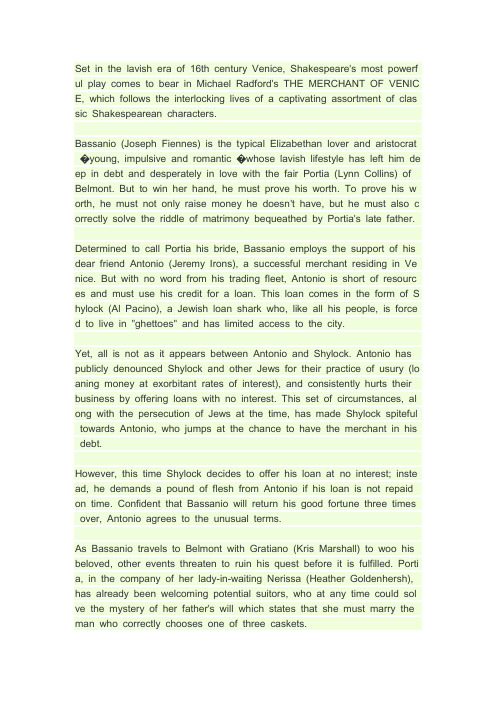
Set in the lavish era of 16th century Venice, Shakespeare's most powerf ul play comes to bear in Michael Radford's THE MERCHANT OF VENIC E, which follows the interlocking lives of a captivating assortment of clas sic Shakespearean characters.Bassanio (Joseph Fiennes) is the typical Elizabethan lover and aristocrat �young, impulsive and romantic �whose lavish lifestyle has left him d eep in debt and desperately in love with the fair Portia (Lynn Collins) of Belmont. But to win her hand, he must prove his worth. To prove his worth, he must not only raise money he doesn't have, but he must also correctly solve the riddle of matrimony bequeathed by Portia's late fathe r.Determined to call Portia his bride, Bassanio employs the support of his dear friend Antonio (Jeremy Irons), a successful merchant residing in Ve nice. But with no word from his trading fleet, Antonio is short of resourc es and must use his credit for a loan. This loan comes in the form of S hylock (Al Pacino), a Jewish loan shark who, like all his people, is force d to live in "ghettoes" and has limited access to the city.Yet, all is not as it appears between Antonio and Shylock. Antonio has publicly denounced Shylock and other Jews for their practice of usury (lo aning money at exorbitant rates of interest), and consistently hurts their business by offering loans with no interest. This set of circumstances, al ong with the persecution of Jews at the time, has made Shylock spiteful towards Antonio, who jumps at the chance to have the merchant in his debt.However, this time Shylock decides to offer his loan at no interest; inste ad, he demands a pound of flesh from Antonio if his loan is not repaid on time. Confident that Bassanio will return his good fortune three times over, Antonio agrees to the unusual terms.As Bassanio travels to Belmont with Gratiano (Kris Marshall) to woo his beloved, other events threaten to ruin his quest before it is fulfilled. Porti a, in the company of her lady-in-waiting Nerissa (Heather Goldenhersh), has already been welcoming potential suitors, who at any time could sol ve the mystery of her father's will which states that she must marry theman who correctly chooses one of three caskets.Then Antonio's trade ships fail to produce any profit for the merchant. A nd, Shylock's daughter Jessica (Zuleikha Robinson) impulsively elopes wit h Bassanio's friend Lorenzo (Charlie Cox); in the process, she escapes with a fair amount of her father's personal wealth. This shatters Shylock to the core and causes him to focus all his energy on the repayment of the debt, almost taking out a lifetime of discrimination on the merchant.Upon hearing of his friend's set of circumstances, Bassanio leaves Belm ont and rushes home to find a solution to Antonio's predicament. But bef ore Bassanio can arrive home, the loan is declared in default and the di straught and semi-deranged Shylock demands his pound of flesh from A ntonio in order to fully seek his revenge.The Duke (Anton Rodgers), the reigning power in the city, has called a l egal expert to the court to proceed over these extraordinary hearings �i s Antonio truly in default on his loan? Is the payment that Shylock is as king for justified? Can Bassanio return in time to save Antonio? In true Shakespearean fashion, all is not as it seems in a story wrought with m orality, revenge, redemption and love./~rbear/shake/mv.html英文原版/wg/s/shashibiya/wnss/中文版评论|27beret12345 |五级采纳率27%擅长:暂未定制按默认排序|按时间排序其他2条回答2006-03-12 21:43亚特兰蒂雅|五级Merchant of Venice 《威尼斯商人》by William Shakespeare/shakespeare/merchant//shakespeare/merchant/summary.htmlPlot OverviewAntonio, a Venetian merchant, complains to his friends of a melancholy t hat he cannot explain. His friend Bassanio is desperately in need of mo ney to court Portia, a wealthy heiress who lives in the city of Belmont. Bassanio asks Antonio for a loan in order to travel in style to Portia’s e state. Antonio agrees, but is unable to make the loan himself because hi s own money is all invested in a number of trade ships that are still at sea. Antonio suggests that Bassanio secure the loan from one of the cit y’s moneylenders and name Antonio as the loan’s guarantor. In Belmont, Portia expresses sadness over the terms of her father’s will, which stip ulates that she must marry the man who correctly chooses one of three caskets. None of Portia’s current suitors are to her liking, and she and her lady-in-waiting, Nerissa, fondly remember a visit paid some time befo re by Bassanio.In Venice, Antonio and Bassanio approach Shylock, a Jewish moneylen der, for a loan. Shylock nurses a long-standing grudge against Antonio, who has made a habit of berating Shylock and other Jews for their usur y, the practice of loaning money at exorbitant rates of interest, and who undermines their business by offering interest-free loans. Although Antoni o refuses to apologize for his behavior, Shylock acts agreeably and offer s to lend Bassanio three thousand ducats with no interest. Shylock adds, however, that should the loan go unpaid, Shylock will be entitled to a p ound of Antonio’s own flesh. Despite Bassanio’s warnings, Antonio agree s. In Shylock’s own household, his servant Lancelot decides to leave Sh ylock’s service to work for Bassanio, and Shylock’s daughter Jessica sch emes to elope with Antonio’s friend Lorenzo. That night, the streets of V enice fill up with revelers, and Jessica escapes with Lorenzo by dressing as his page. After a night of celebration, Bassanio and his friend Grazi ano leave for Belmont, where Bassanio intends to win Portia’s han d.In Belmont, Portia welcomes the prince of Morocco, who has come in a n attempt to choose the right casket to marry her. The prince studies th e inscriptions on the three caskets and chooses the gold one, which pro ves to be an incorrect choice. In Venice, Shylock is furious to find that his daughter has run away, but rejoices in the fact that Antonio’s ships are rumored to have been wrecked and that he will soon be able to claim his debt. In Belmont, the prince of Aragon also visits Portia. He, too, studies the caskets carefully, but he picks the silver one, which is also i ncorrect. Bassanio arrives at Portia’s estate, and they declare their love f or one another. Despite Portia’s request that he wait before choosing, B assanio immediately picks the correct casket, which is made of lead. He and Portia rejoice, and Graziano confesses that he has fallen in love wi th Nerissa. The couples decide on a double wedding. Portia gives Bassa nio a ring as a token of love, and makes him swear that under no circu mstances will he part with it. They are joined, unexpectedly, by Lorenzo and Jessica. The celebration, however, is cut short by the news that Ant onio has indeed lost his ships, and that he has forfeited his bond to Sh ylock. Bassanio and Graziano immediately travel to Venice to try and sa ve Antonio’s life. After they leave, Portia tells Nerissa that they will go to Venice disguised as men.Shylock ignores the many pleas to spare Antonio’s life, and a trial is call ed to decide the matter. The duke of Venice, who presides over the trial, announces that he has sent for a legal expert, who turns out to be Por tia disguised as a young man of law. Portia asks Shylock to show merc y, but he remains inflexible and insists the pound of flesh is rightfully his. Bassanio offers Shylock twice the money due him, but Shylock insists o n collecting the bond as it is written. Portia examines the contract and, f inding it legally binding, declares that Shylock is entitled to the merchant’s flesh. Shylock ecstatically praises her wisdom, but as he is on the ver ge of collecting his due, Portia reminds him that he must do so without causing Antonio to bleed, as the contract does not entitle him to any blo od. Trapped by this logic, Shylock hastily agrees to take Bassanio’s mon ey instead, but Portia insists that Shylock take his bond as written, or n othing at all. Portia informs Shylock that he is guilty of conspiring agains t the life of a Venetian citizen, which means he must turn over half of h is property to the state and the other half to Antonio. The duke spares Shylock’s life and takes a fine instead of Shylock’s property. Antonio als o forgoes his half of Shylock’s wealth on two conditions: first, Shylock m ust convert to Christianity, and second, he must will the entirety of his e state to Lorenzo and Jessica upon his death. Shylock agrees and takes his leave.Bassanio, who does not see through Portia’s disguise, showers the youn g law clerk with thanks, and is eventually pressured into giving Portia th e ring with which he promised never to part. Graziano gives Nerissa, who is disguised as Portia’s clerk, his ring. The two women return to Belm ont, where they find Lorenzo and Jessica declaring their love to each ot her under the moonlight. When Bassanio and Graziano arrive the next d ay, their wives accuse them of faithlessly giving their rings to other wom en. Before the deception goes too far, however, Portia reveals that she was, in fact, the law clerk, and both she and Nerissa reconcile with their husbands. Lorenzo and Jessica are pleased to learn of their inheritance fro m Shylock, and the joyful news arrives that Antonio’s ships have in f act made it back safely. The group celebrates its good fortune.~~~~~~~~~~~~~~~~~~~~~~~~~~~~~~~~~~/Shakespeare/merchant/full.html英文版/book/book/waiguo/shakespeare/wnss/index.html中文版评论(1)|1检举|2006-03-10 20:39飓风飘颻|八级《威尼斯商人》英文简介:Maurice, Sami, Simon, Elie and Edouard are still unknown actors despite their late thirties. But one day, Grinchenberg, the famous American director, comes to Paris looking for the lead role in hi s Yiddish adaptation of the Merchant of Venice. Maurice gets the part! It is the major breakthrough he has been waiting for. He rushes home to proudly announce the big news to his wife Perla. But Perla also has n ews for him: she is very ill. Unfortunately, the part eventually goes to a famous American star. Maurice doesn't have the heart to tell Perla, so w ith his friends' help, he will go all the way to make his wife believe that he still has the part, and will end up playing the role of his life to prot ect her。
英语威尼斯商人 (1) 2

•
•
When Shylock’s daughter Jessica runaway(逃亡) home with all his money and jewels, he becomes furious(狂怒的). Meanwhile, the load of Antonio sinks with three different vessels(船只) and he is not able to pay his debts with Shylock, and the Jew goes to court of Venice claiming the execution(实施) of his deal. To save Antonio’s life, Barcelona(巴萨尼奥) posing counsel, she agreed to Shylock's request, but demands a pound of meat must be cut by just a pound of flesh, no more and no less, but are not allowed to bleed. Shylock can not be performed due to the lost, evil without even losing the property.
简介:
The Merchant of Venice is the important early works of Shakespeare,Is a comedy with a great satirical 。It’s about to make in 1596 ~ 1597
《威尼斯商人》 是莎士比亚早期的重要作品,是一部具有极大讽刺性 的喜剧。大约作于1596~1597年。
《威尼斯商人》莎士比亚【英文】

Trade of Venice
Situated on the Adriatic Sea, Venice always traded with the Byzantine Empire and the Muslim world extensively. By the late thirteenth century, Venice was the most prosperous city in all of Europe. At the peak of its power and wealth, it had 36,000 sailors operating 3,300 ships, dominating Mediterranean commerce. During this time, Venice's leading families vied with each other to build the grandest palaces and support the work of the greatest and most talented artists.
Theatrical Traditions of Jews
犹太人在戏剧上的传统体现
• Roots of Shakespearean drama begin with mystery and miracle plays of the Middle Ages, which were performed by the church for a largely illiterate(文盲) audience about Old and New Testament stories. Jews were often viewed as responsible for Christ‟s crucifixion(钉死在十字架 上). • Jews became the evil villains(反派角色) of Elizabethan drama. They were one-dimensional (一元空间) stereotypical characters. • The Jew of Malta(马耳他岛的犹太人), written in 1589 by Christopher Marlowe, is one such work. Marlowe was Shakespeare greatest rival.
英语文献综述样本威尼斯商人
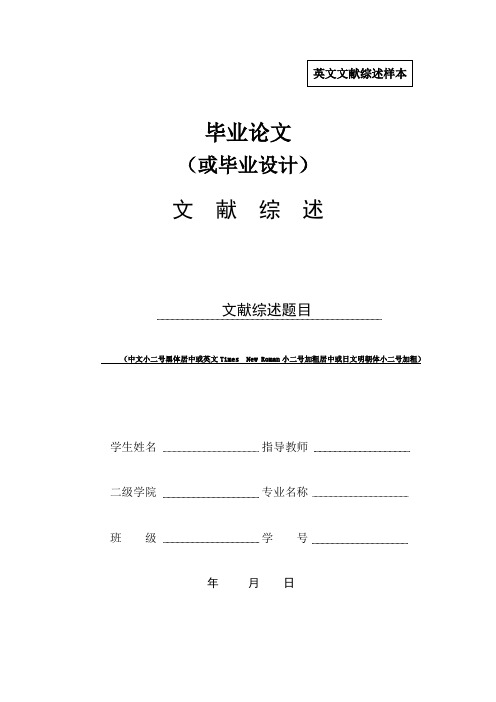
毕业论文(或毕业设计)文献综述文献综述题目(中文小二号黑体居中或英文Times New Roman小二号加粗居中或日文明朝体小二号加粗)学生姓名指导教师二级学院专业名称班级学号年月日(标题Times New Roman三号加粗)The Literature ReviewofThe Mystery of Antonio’s Sadness in The Merchant of Venice (正文用Times New Roman小四,1.5倍行距,各段首行空4个字符,书名用斜体加粗)Written sometime between 1596 and 1598, The Merchant of Venice is classified as both an early Shakespearean comedy (more specifically, as a "Christian comedy") and as one of the Bard's problem plays; it is a work in which good triumphs over evil, but serious themes are examined and some issues remain unresolved.In The Merchant of Venice , Shakespeare wove together two ancient folk tales, one involving a vengeful, greedy creditor trying to exact a pound of flesh, the other involving a marriage suitor's choice among three chests and thereby winning his (or her) mate. Shakespeare's treatment of the first standard plot scheme centers around the villain of Merchant, the Jewish moneylender Shylock, who seeks a literal pound of flesh from his Christian opposite, the generous, faithful Antonio. Shakespeare's version of the chest-choosing device revolves around the play's Christian heroine Portia, who steers her lover Bassanio toward the correct humble casket and then successfully defends his bosom friend Antonio from Shylock's horrid legal suit. Antonio, as the title character, is sad from the beginning to the end of the play but never names the cause of his melancholy even when his friends ask him. Antonio plays the role as an outcast in the play. Shakespeare uses Antonio’s sadness simply as the device to set the tragic tone in the comedy or make Antonio be one of his melancholic characters in his works? Or Antonio is the representative of the complicated human nature? Antonio's unexplained melancholy is a significant element in understanding the play.1. Studies on The Merchant of V enice(Times New Roman + 四号+首缩进4字符,下同)Karl Marx once cited that Shakespeare is the greatest playwright in the world.Shakespeare’s comedy The Merchant of Venice is one of the most influential comedies in his works. Shylock has mostly been the center of the research on the play.The Merchant of Venice was first printed in 1600 in quarto, of which nineteen copies survive. This was followed by a 1619 printing, and later an inclusion in the First Folio in 1623. The play was written shortly after Christopher Marlowe’s immensely popular Jew of Malta (1589), a play wherein a Jew named Barabas plays a greatly exaggerated villain. The portrayal of Shakespeare's Jew was and remained comic until the late 1700s at which time he was first played as a true villain. In 1814 Shylock’s role was depicted as a character to be pitied, and in 1879 he was first portrayed as a tragic character. Subsequent interpretations have varied greatly over the years, but since World War II he has most often been conceived of as tragic. The Merchant of Venice has been described as a great commentary on the nature of racial and religious interactions.2. Deficiencies of Previous Studies on the Mystery of Antonio’s Sadness in The Merchant of V eniceThe title character, Antonio, begins the play intriguingly: "In sooth, I know not why I am so sad; / It wearies me" (I.i.1-2). Much ink has been spilled with conjectures about Antonio's melancholy: that he's simply melancholic of temperament, that his devotion to Bassanio is homoerotic and the news that this friend seeks to marry has depressed him (Antonio is a name Shakespeare uses also in Twelfth Night for a character with an intense devotion to another male), or that he has an "ominous foreboding" about the events that will transpire in the course of this play. Although those pioneers aroused people to think much of The Merchant of Venice and left us invaluable and systematic reference, and made many achievements in description and explanation of the cause of Antonio’s sadness, there remain many deficiencies.First, The Merchant of Venice, which is co nsidered to be one of Shakespeare’s four great comedies, actually functions as Shakespeare's farewell to comedy. Antonio is one of Shakespeare’s melancholic characters. Shakespeare in The Merchant of Venice is undermining all that passes for comic entertainment. Shakespeare uses Antonio’ssadness as a device to set the tragic tone in the comic atmosphere.Second, a lot of issues that are argued about regarding The Merchant of Venice can be considerably clarified if we know something about the audience it was written for. In the modern, post-Holocaust readings of the play, the problem of anti-Semitism in the play has been discussed a lot. Given that Antonio decides not to seize Shylock’s goods as punishment, we might consider Antonio to be merciful. But we may also question whether it is merciful to return to Shylock half of his goods, only to take away his religion and his profession. Antonio’s compassion seems to stem as much from self-interest as from concern for his fellow man. Shakespeare thus shows a balance of prejudice on both sides. The question whether Antonio is a homosexual in love with Bassanio can also interpreted differently.5. ConclusionDespite the researches already done and achievements already made on the subject, many frontiers are still waiting to be explored. On the basis of the previous researches by forerunners and adopting new approaches we are to make a deeper and more comprehensive understanding of this subject. We don't mean to suggest that other ways of looking at the play are "wrong." In fact, one of the things that is so great about Shakespeare is that there are so many different ways of interpreting his plays that all work.References (Times New Roman四号加粗)参考文献不应少于10条,参考文献应按英文26个字母的顺序排列,先列外文文献后列中文文献,中文用宋体小四,外文用Times New Roman小四。
威尼斯商人英文简介
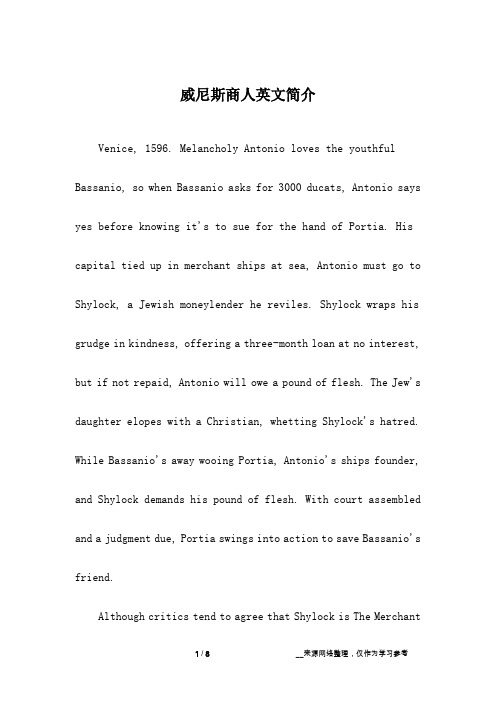
威尼斯商人英文简介Venice, 1596. Melancholy Antonio loves the youthful Bassanio, so when Bassanio asks for 3000 ducats, Antonio says yes before knowing it's to sue for the hand of Portia. His capital tied up in merchant ships at sea, Antonio must go to Shylock, a Jewish moneylender he reviles. Shylock wraps his grudge in kindness, offering a three-month loan at no interest, but if not repaid, Antonio will owe a pound of flesh. The Jew's daughter elopes with a Christian, whetting Shylock's hatred. While Bassanio's away wooing Portia, Antonio's ships founder, and Shylock demands his pound of flesh. With court assembled and a judgment due, Portia swings into action to save Bassanio's friend.Although critics tend to agree that Shylock is The Merchantof Venice’s most noteworthy figure, no consensus has been reached on whether to read him as a bloodthirsty bogeyman, a clownish Jewish stereotype, or a tragic figure whose sense of decency has been fractured by the persecution he endures. Certainly, Shylock is the play’s antagonist, and he is menacing enough to seriously imperil the -happiness of Venice’s businessmen and young lovers alike. Shylock is also, however, a creation of circumstance; even in his single-minded pursuit of a pound of flesh, his frequent mentions of the cruelty he has endured at Christian hands make it hard for us to label him a naturalborn monster. In one of Shakespeare’s most famous monologues, for example, Shylock argues that Jews are humans and calls his quest for vengeance the product of lessons taught to him by the cruelty of Venetian citizens. On the other hand, Shylock’s coldly calculated attempt to revenge the wrongs doneto him bymurdering his persecutor, Antonio, prevents us from viewing him in a primarily positive light. Shakespeare gives us unmistakably human moments, but he often steers us against Shylock as well, painting him as a miserly, cruel, and prosaic figure.Portia Quick-witted, wealthy, and beautiful, Portia embodies the virtues that are typical of Shakespeare’s heroines —it is no surprise that she emerges as the antidote to Shylock’s malice. At the beginning of the play, however, we do not see Portia’s potential for initiative and resourcefulness, as she is a near prisoner, feeling herself absolutely bound to follow her father’s dying wishes. This opening appearance, however, proves to be a revealing introduction to Portia, who emerges as that rarest of combinations—a free spirit who abidesrigidly by rules. Rather than ignoring the stipulations of her father’s will, she watches a stream of suitors passher by, happy to see these particular suitors go, but sad that she has no choice in the matter. When Bassanio arrives, however, Portia proves herself to be highly resourceful, begging the man she loves to stay a while before picking a chest, and finding loopholes in the will’s provision that we never thought possible. Also, in her defeat of Shylock Portia prevails by applying a more rigid standard than Shylock himself, agreeing that his contract very much entitles him to his pound of flesh, but adding that it does not allow for any loss of blood. Anybody can break the rules, but Portia’s effectiveness comes from her ability to make the law work for her. Portia rejects the stuffiness that rigid adherence to the law might otherwise suggest. In her courtroom appearance, she vigorously appliesthe law, but still flouts convention by appearing disguised as a man. After depriving Bassanio of his ring, she stops the prank before it goes to far, but still takes it far enough to berate Bassanio and Graziano for their callousness, and she even insinuates that she has been unfaithful.Antonio Although the play’s title refers to him, Antonio is a rather lackluster character. He emerges in Act I, scene i as a hopeless depressive, someone who cannot name the source of his melancholy and who, throughout the course of the play, devolves into a self-pitying lump, unable to muster the energy required to defend himself against execution. Antonio never names the cause of his melancholy, but the evidence seems to point to his being in love, despite his denial of this idea in Act I, scene i. The most likely object of his affection is Bassanio, who takes full advantage of the merchant’s boundlessfeelings for him. Antonio has risked the entirety of his fortune on overseas trading ventures, yet he agrees to guarantee the potentially lethal loan Bassanio secures from Shylock. In the context of his unrequited and presumably unconsummated relationship with Bassanio, Antonio’s willingness to offer up a pound of his own flesh seems particularly important, signifying a union that grotesquely alludes to the rites of marriage, where two partners become ―one flesh.‖ Further evidence of the nature of Antonio’s feelings for Bassanio appears later in the play, when Antonio’s proclamations resonate with the hyperbole and self-satisfaction of a doomed lover’s declaration: ―Pray God Bassanio come / To see me pay his debt, and then I care not‖ (III.iii.35–36). Antonio ends the play as happily as he can, restored to wealth even if not delivered into love. Without a mate, he is indeed the ―taintedwether‖—or castrated ram—of the flock, and he will likely return to his favorite pastime of moping about the streets of Venice (IV.i.113). After all, he has effectively disabled himself from pursuing his other hobby—abusing Shylock—by insisting that the Jew convert to Christianity. Although a sixteenth-century audience might have seenthis demand as merciful, as Shylock is saving himself from eternal damnation by converting, we are less likely to be convinced. Not only does Antonio’s reputation as an anti-Semite precede him, but the only instance in the play when he breaks out of his doldrums is his ―storm‖ against Shylock(I.iii.132). In this context, Antonio proves that the dominant threads of his character are melancholy and cruelty.。
威尼斯商人故事梗概英文

Retell of The merchant of VeniceThe story begins with a wedding. Antonio has a friend named Bassanio who spends money without limitation. As a result, he run out of his property in a short time. One day, he wants to marry a Portia, a wealthy heiress of Belmont. He was required to pay 3,000 ducats. So he went to Antonio for help. Antonio also is a wealthy Venetian merchant but he doesn’t have so much cash because his ships and goods are busy at sea. It was very kind of Antonio so he borrowed money from Shylock.Antonio has already made an enemy of Shylock. On the one hand, Antonio is an honest merchant and he usually lend money without interests which forces Shylock to make lower rate. On the other hand, Antonio hates Jewish very much. He had attacked Shylock in public place. Shylock wants to take revenge on Antonio. He agree to lend money to Antonio without interest but if Antonio can’t return the money in three months, Shylock can take a pound of Antonio’s flesh. Antonio signs the contact.Portia was a rich man's daughter. According to her father‘s will, she got three boxes: a gold box, a silver one, and a lead one. She would marry the man who chooses the box contained her portrait. However, suitors from all over the world gathered here to marry this beautiful heiress. Bassanio and Gratiano went to Belmont to chase Portia. Bassanio thinks he shouldn’t judge thinks by the appearance so hechose the lead box which equipped with Portia’s portrait. Portia sent Bassanio a ring and told he that if the ring lost means their love is over. Portia’s maid Nerissa fell in love with Gratiano. She also sent Gratiano a ring.At this moment, Bassanio hears about Antonio's ships are reported lost at sea. This leaves him unable to return the money. Unfortunately, Shylock's daughter, Jessica eloped at the help of Antonio and stole her father's money and jewelry. So Shylock hated Antonio very much. When he knew that Antonio’s accident, he was very happy. He sued Antonio. In court, Shylock urged Antonio strongly that he must cut one pound of flesh from his own body. The judges had no clues to do with Shylock. At the last minute, a new judge disguised by Portia came to deal with the matter. According to the contract, Portia agreed Shylock to cut a pound of flesh from Antonio, but he must be care with the weight, neither more nor less. What’s more, he must promise cut without a drop of blood and Antonio is alive. Otherwise, Shylock will lose all his property. Shylock couldn't do it and had to give up to save his money. In this way, Portia skillfully save Antonio's life.Finally, everything was clear. Bassanio knew his wife was the great judge when seeing the ring. He felt very thankful for Portia’s help and loved her much more. Antonio got his own property. Everyone get what he wants expect poor Sherlock.。
威尼斯商人英文版
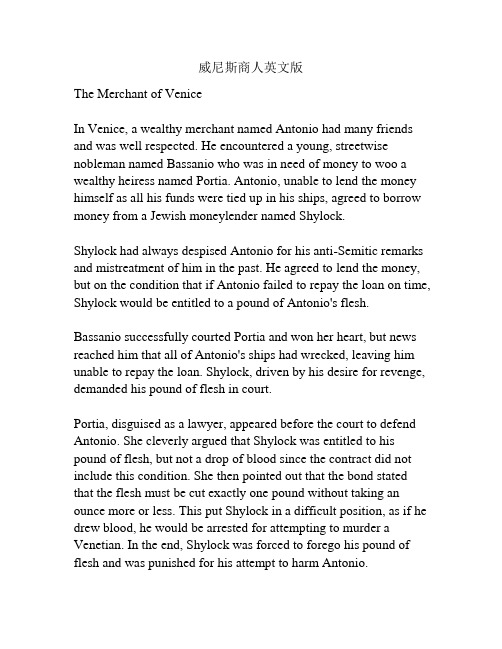
威尼斯商人英文版The Merchant of VeniceIn Venice, a wealthy merchant named Antonio had many friends and was well respected. He encountered a young, streetwise nobleman named Bassanio who was in need of money to woo a wealthy heiress named Portia. Antonio, unable to lend the money himself as all his funds were tied up in his ships, agreed to borrow money from a Jewish moneylender named Shylock.Shylock had always despised Antonio for his anti-Semitic remarks and mistreatment of him in the past. He agreed to lend the money, but on the condition that if Antonio failed to repay the loan on time, Shylock would be entitled to a pound of Antonio's flesh.Bassanio successfully courted Portia and won her heart, but news reached him that all of Antonio's ships had wrecked, leaving him unable to repay the loan. Shylock, driven by his desire for revenge, demanded his pound of flesh in court.Portia, disguised as a lawyer, appeared before the court to defend Antonio. She cleverly argued that Shylock was entitled to his pound of flesh, but not a drop of blood since the contract did not include this condition. She then pointed out that the bond stated that the flesh must be cut exactly one pound without taking an ounce more or less. This put Shylock in a difficult position, as if he drew blood, he would be arrested for attempting to murder a Venetian. In the end, Shylock was forced to forego his pound of flesh and was punished for his attempt to harm Antonio.Several subplots revolve around the court case, including the story of Portia disguising herself to choose amongst three caskets to find a suitable suitor. She marries Bassanio, and they are richly rewarded.The play explores themes of love, loyalty, justice, and prejudice. It challenges societal norms and sheds light on the consequences of hatred and revenge. Despite its controversial portrayal of a Jewish character, "The Merchant of Venice" remains one of Shakespeare's most enduring works.。
《威尼斯商人》英文书评bookreport
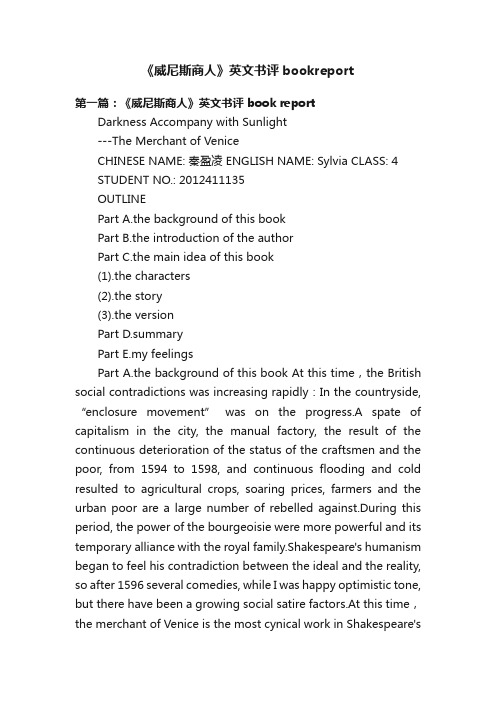
《威尼斯商人》英文书评bookreport第一篇:《威尼斯商人》英文书评 book reportDarkness Accompany with Sunlight---The Merchant of VeniceCHINESE NAME: 秦盈凌 ENGLISH NAME: Sylvia CLASS: 4STUDENT NO.: 2012411135OUTLINEPart A.the background of this bookPart B.the introduction of the authorPart C.the main idea of this book(1).the characters(2).the story(3).the versionPart D.summaryPart E.my feelingsPart A.the background of this book At this time,the British social contradictions was increasing rapidly:In the countryside, “enclosure movement” was on the progress.A spate of capitalism in the city, the manual factory, the result of the continuous deterioration of the status of the craftsmen and the poor, from 1594 to 1598, and continuous flooding and cold resulted to agricultural crops, soaring prices, farmers and the urban poor are a large number of rebelled against.During this period, the power of the bourgeoisie were more powerful and its temporary alliance with the royal family.Shakespeare's humanism began to feel his contradiction between the ideal and the reality, so after 1596 several comedies, while I was happy optimistic tone, but there have been a growing social satire factors.At this time,the merchant of Venice is the most cynical work in Shakespeare'searly comedies.Part B.the introduction of the author William Shakespeare(1564 ~ 1616)is the great playwright in the period of English Renaissance.He is a poet , the European Renaissance humanist literature synthesizer, born in England Warwickshire Stratford town on April 23rd ,1564.There are four representative tragedies “Hamlet” , “Othello”, “King Lear”, “Macbeth”, and four comedies “Twelfth Night”, “A Midsummer Night's Dream,” “The Merchant of Venice”, historical drama “Henry IV,” “Henry V”, “Li Richard II ”and so on.He also wrote 154 sonnets and three or four heads of poetries.He is “the father of the British drama”.Ben Jonson called him “the soul of the era,” and Marx called him “one of humanity's greatest geniuses.” Shakespeare is just an English writer, but he is a world famous writer.Most of his works have been translated into many languages, and his plays are staged in many countries.Part C.the main idea of this book Main characters: Antonio, the merchant of Venice.He is the emerging bourgeoisie businessman.He treasures friendship, for friends borrow money from Shylock and die without hatred;His magnanimity, in the face of Shylock shameless plot, unexpectedly resigned;Faced with the threat of death, he has a Roman hero in a crisis, the death of manhood.In a short, he has a decent, heavy affection, and the quality of urbanity and humanist.Bassanio, the friend of Antonio.He is warm, and he has heavy feeling and righteousness, but he do not know the strategy, is relatively weak Shylock, the rich Jewish.He is a representative of the usury capital, is a clam scrooge.He is a real devil.At the same time, he is also a poor man in Christian society.Jessica, the daughter of Shylock.Lorenzo, the lover of Jessica.Portia,the daughter of a gone rich-man.She is well-learned, witty, brave to aid her husband's friend, and has thetutelage of a new era of women.She is a lively, cheerful, generous, humorous and full of wisdom Nerissa, the maidservant of Portia.Other characters: Morocco and Arragon, the suitors of Portia.Tubal, the friend of uncelot, the servant of Shylock, he acted as a clown.Gobbo, Lancelot’s father.The story: Antonio, the businessman of Venice, in order to help his friend, Bassanio, marry Portia, borrowed money to his enemy-Jewish Shylock.If Antonio can not pay back the money as promised, Shylock would cut off one pound of his flesh.Unexpected, Bassanio’s ships overturned at sea, so he can’t repay timely, Sherlock was on the court.Steadily abuse d, Shylock’s daughter Jessica escaped with her lover, Lorenzo, so Sherlock was angry and irritated to go to the Venice Court.He refused to reconciliation definitely and resolutely followed the note clause that he cut a pound of flesh from Antonio.At this time, the story culminates exciting.On the other hand, in the elegant Belmont Manor, the rich and beautiful girl Portia had a deep sigh because her marriage must depend on gold, silver and lead boxes made by his father.Which one can choose the true box was her husband.Portia’s father deprived of her marital autonomy.Fortunately, her affection chose the right box.The above two plots join together in the scene of “court”, Portia dressed as a doctor of law in the moment of thousands of all round shouted 'wait a minute!'and pointed out the pact said that he only desired a pound of flesh, but didn't say that he can get a drop of blood.Shylock naturally can not only cut Antonio's flesh, and not let him bleed.Portia with intellect rescued her husband's friend.After winning this case, Portia pretended not to recognize her husband and wanted his wedding rings as a victory for the home and for pretence blame him, lead to a quarrel ofcomedy.Finally in an Epiphany bassanio, there was a happy ending.The version: The Merchant of Venice has repeatedly been on the big screen, the following is a high-profile version.1914 –A silent film directed by Lois Weber.Ms.Weber was the first American female director of the Merchant of Venice, she also played a role as Portia.1916-A silent British film directed by Walter West.1973-John Sichel directed TV urence Oliver plays Shylock, Anthony Nichols plays Antonio, and Jeremy Brett plays Bassanio, Joan Plowright Portia plays 1980-BBC television series, a film directed by Jack Gold.Gemma Jones plays Portia, Warren Mitchell plays Shylock.1996BBC produced television series, directed by Trevor Nunn.The Royal National Theatre Henry Goodman performed Shylock.2002Shakespeare's Merchant directed by Paul Wagar and co-produced by Lorenda Starfelt, Brad Mays and Paul Wagar 2004-Directed by Michael Radford.Al Pacino plays Shylock;Jeremy Irons plays Antonio, Joseph Fufan Burns performances Bassanio, Lynn Collins performances Portia.There is also a network game Mabinogi Mabinogi adapted the screenplay as the game's main task.Part D.summary Shylock in the merchant of Venice has a deep impression to me, although he is a miser, and petty revenge-heart heavily who tries his best to revenge all people who have abused him.He even wants to kill the opponents.But I think it's unfair.Because Shakespeare shaped Shylock to be the evil role and incisively and vividly described his sinister and vicious.Antonio is completely beautification: he treasures friendship, for friends borrow money from loan Shylock and die without regret;He manganese, in the face of Shylock shameless plot.Faced with the threat of death, he has in a crisis, the death of manhood like the Roman heroes.In a short, he has a decent, heavy affection, urbane and humanist quality of rettingof songs.Even in the 16th century Europe's most powerful and free city Venice, the intolerance of the Jews at the time also can't change the fact.According to law, the Jewish are forced to live in isolation of old factory building wall or slum, the door will be locked after sunsetis guarded by Christians.Any Jews left slum area during the day forced to put on a show that they are “Jew” as to the identity of the red hat.Jews were forbidden to own property, so they can only be usury, and will charge interest on the money borrowed and that is in violation of the law of Christianity.The merchant of Venice they turned a blind eye, but for hostile to the Jewish religious zealots are completely different.They will be beating abuse or even deprived of the rights of Jewish life.And this kind of unfairness is to make Shylock the main reason for abnormal personality.So Shylock is a tragic character.Not he, but the society should be hated, because it’s the sad society that created a tragedy of Shylock.Part E.my feelingsThis book shows me many things.After reading this book, I know that the importance of friendship and love.Whenever we feel frustrated, our relatives and friends can help us out.Although money is important, in this world, there are many more important things t han money;we shouldn’t be fooled by the phenomenon of surface.In our reality life you can't discriminate against anyone because of his own superiority.At the same time, we should act like Portia because she wasn’t be threatened by the sudden difficulty and face the difficulties bravely.And I think most of us are kindly, but the society can change our characters.In some degree, whether the government is cruel or not can influence the citizens’ characters and thoughts.I do think that Antonio is only used to foil Shylock, a small role.Although Shakespeare satire theJewish businessman Shylock, he also showed the European government discrimination and exclusion of the Jews.In a word, it stresses the point.第二篇:双城记英文简介 bookreport专用A Tale of Two Cities It was the year 1757, the doctor Manette lived in Pairs.And one day he treated a young woman who was hurt by ME family.And the young woman’s husband was killed by them.The doctor felt very angry when he heard the young woman’s miserable experiences.He decided to cla imed crimes of ME to the king’s court.So he wrote a letter to the court.Some days later, several men came to Manette’s house and asked him to treat a patient.Manette agreed and followed these men.But these man were ME members.They put Manette into prison.M anette’s family didn’t find him anywhere.Just several months later his wife gave birth to a baby called Lucie.18 years had passed.It was 1775.The doctor’s daughter Lucie was 18 years old.At that time she lived in London.She just was brought up by Miss Spross, because when Lucie was 2 years old her mother was dead.One day she suddenly received a letter that said she should immediately went to Pairs for getting some information about her father.She felt shocked and went to Pairs as soon as possible.On the ways to Pairs, Lucie met other main character in this book--Charles.He was a son of the ME’s leader.But he hated his father and relatives’ cruel actions to low class people, so he moved to England and exchanged his name to Charles.At that time, no one knew his real identity.He fell in love with the beautiful Luciel.When Lucie arrived in the Pairs, she met her father’s old friend Mr.Lorry.Mr.Lorry brought Lucie to meet her father’s former servant--Ernest Defarge.At that time Defarge and his wife Madame Defarge ran a bar in Pairs.Throughall people’s effort, Lucie met her father at first time.Her father was weak and filthy.When Manette knew he had a daughter in the world he held his daughter and cried.Then Mr.Lorry, Lucie and her father came back to London.Lucie and her father had a harmonious and peaceful life in London.Lucie took care of her father very well.And her father recovered, he became a doctor again.After 5 years, Charle whom I told you before Lucie met him on the way to Pairs was sued.Lucie who was a witness also joined the trial.In the trial, Charle’s lawyer Carton discovered remarkable details for proving Charle was innocent.Finally the jury announced the verdict –Charle was not guilty.During the trial, the lawyer Carton who perceived Lucie’s golden q uality and beauty also fell in love with her.Some days later, Charle took courtship to Lucie and Lucie accepted.During the wedding, Charle told Lucie’s father, who is the doctor, his real identity that he came from ME and so on.The doctor felt shocked.He stayed prison for 18 years just for ME.But doctor decided to keep this secret because he was more concerned about his daughter’s happiness.After the wedding, Carton still kept very close relationship with the young couple.In his mind, his happiness is not marrying her but knowing her happiness.In 1789, the revolution erupted in France.When Chale got this news, he had to go back to France to help his old friends in Pairs.But when he just arrived on Pairs, he was arrested for he was an/the Emigrant.Because revolutionist hated the English Emigrant very much, he was put into the prison.In London when Lucie, Manette, Carton and Mr.Lorry heard the bad news, they rushed to Pairs.The revolutionists welcome Manette due to his suffering in Bastill.Soon, at Charle’s tri al, by a unanimous vote, Charle was freed.But a few hours later, Charle was arrested again for his realidentity.And he was denounced by Madame Defarge.Several days later, the court announced that Charle was one of ME, a former noble man, and an enemy of the Republic, one of family of tyrants that lived off the blood of the people!Court decided to execute Charles by guillotine in twenty-four hours.Everyone felt painful and hopeless except Madame Defarge.Someone can ask why Madame Defarge hated Chale so much and why she still wanted to kill him? Now, please look at block broad.Can you remember that ME hurt a young lady and killed the lady’s husband? Madame Defarge was the last survivor in this pathetic family.Until now, whole things became clear and reasonable.When Carton saw Lucie’s pale face and hopeless eye, he felt some swords penetrated into his heart.He made a holy and brave decision.He decided to save Charles who was in prison and replaced him to die because of loving Lucie.At that time, Madame Defarge was saturated into revenge, so she brought pistol to Lucie’s apartment.She not only wanted to kill Charles, but also wanted to kill his whole family.She had been deeply indulged in the revenge.On the fight between Madame Defarge and Lucie’s servant, Defarge was killed by her pistol.Soon Carton went to the prison and bribed a prison official to let him go into the prison.Then, he drunk Charles and exchanged their clothes.Finally, the prison official brought Charles to Lucie’s apartment.The last minute came and Carton was brought to the guillotine.As his cart rumbled toward the platform, he turned his eyes toward London and said: I see them holding a special place for me in their hearts, remembering me with love.Yes, this is a far, far better thing that I am doing than anything I have ever done in my life.END 因为爱情简单的生长依然随时可以为你疯狂因为爱情怎么会有沧桑所以我们还是年轻的模样第三篇:威尼斯商人_英文_读后感The Merchant of VeniceShakespeare is Britain's the most outstanding Renaissance masters.Shakespeare's play, “The Merchant of Venice” explored the timeless topic of money and love.Money is the world's most valuable things.There is something even more precious than money? Rich and moving story of family ties, witty dialogue, the plot turn, exaggerated the circumstances of Comedy, romance and legend is full of color.Is intertwined with friendship, love, love the world and lead us to understanding what is important in life.The play tells a story that happens in Italy.A moneyless young Venetian, Bassanio, is making preparations to propose to Portia, a rich beauty of Belmont.He needs money and appeals to his friend Antonio, a merchant of Venice, for help.But Antonio‟s money is invested in ships at sea.To help Bassanio in his courtship, he borrows money from Shylock the Jewish usurer.Shylock, who has been insulted by Antonio and other Christians, however, agrees to lend the money on the condition that if the loan is not paid in time, he may cut a pound of flesh from Antonio‟s body.With this money, Bassanio goes to Belmont and succeed in the marriage with Portia.But news comes that Antonio‟s ship sank and can‟t return on time so he cannot pay the loan.Shylock demands his pound of flesh.The case is brought before the court.Antonio is in danger.At the critical moment, a young doctor of law arrives at the court.He appeals to Shylock for mercy with a moving speech, but in vain.Then the doctor admits the validity of Shylock‟s claim, but warns him, under pain of death, that he must fulfill the every letter of his bond, taking no more and noless than one pound of flesh, and spilling no drop of blood.Seeing himself thus cornered, the Jew has no choice but to obey the verdict of the court.To everyone‟s surprise, the young doctor of law who saves the life of Antonio is Portia in disguise.Finally they live together happily.The story has a happy ending in theory.But I don‟t think the end is really happy and is a kind of “grave comedy”.In this single-minded pursuit of a pound of flesh, his frequent mentions of the cruelty he has endured at Christian hands make it hard for us to label him a natural born monster.In one of Shakespeare‟s most famous monologues, for example, Shylock argues that Jews are humans and calls his quest for vengeance the product of lessons taught to him by the cruelty of Venetian citizens.On the other hand, Shylock‟s coldly calculated attempt to revenge the wrongs done to him by murdering his persecutor, Antonio, prevents us from viewing him in a primarily positive light.Shakespeare gives us unmistakably human moments, but he often steers us against Shylock as well, painting him as a miserly, cruel, and prosaic figure.But I think Shylock suffers much discrimination for he is a Jew.It…s unfair.All men were born equally.We can learn much from the play.Money is important, but there are many far more important things in this world.Do not be fooled by the surface.In our real live we should threat everyone equally and do not have color vision to look at other people.And when we meet with unexpected difficulties, we should keep calm and solve it skillfully just as Portia does......第四篇:威尼斯商人英文读后感威尼斯商人英文读后感文家街道逢源小学五年级一班张彤辅导教师庞玉玲«The Merchant of Venice»response papers A few days ago, I read a Book of Shakespeare's comedy “the merchant of Venice”.This book is mainly about Antonio's friend Bassani O Sherlock to borrow money, because Bassani O will ask Portia to marry him.Sherlock Antonio's call for a pound of his flesh instead of merchant.Antonio promised, made a contract with him.Bassanio be jubilant to Belmont takes off the engagement, Gorai Sian Nor also went to, he likes the Portia of maid, Lisa, two couples got married.Antonio sent a letter, said Antonio is going to be from Sherlock who cut off a pound of meat.Hearing this news, Bassanio, and Gorai Sian Nor hurriedly ran back to Venice, Bocia and Johnny Lisa dressed up as a lawyer and secretary, secretly follow to save Antonio.In court, Bocia wisely promised Sherlock can stripping Antonio of any one pound of flesh, but, if shed a drop of blood of words, with his life and property to the penance.Bocia played a joke on her husband.She asked with a ring as a defense for Antonio return, then returned home.When her husband came back, they blame they ignore the significance of wedding rings, and insist the certain is they took him to another woman.A series of embarrassing explanation, finally revealed the truth.Everyone has a happy ending, except that Sherlock wanted to hoist with his ownI think money is not essential things, in my mind from Bassanio.Antonio.Portia them I feel between them friends friendship is really precious.In the book, each plot is so touching. 第五篇:威尼斯商人英文剧本1、Gelayiano2、巴萨尼奥Basaniao:3、安东尼奥Antonion:4、夏洛克Shylock5、鲍西娅Baoxiya6、公爵Duke 7SecretaryD: Have mercy on Antonio, Shylock.Do not be so bitter.S: I've promised to take my pound of flesh.If you do not let me have it, that will be a sign of weakness and no one will trust your laws any more.The greatness of Venice will soon be lost.Antonio is my enemy, and I hate him.B: Do all men kill the things they do not love?公爵:宽恕安东尼奥吧,夏洛克,别这样怀恨在心。
英文文献综述样本 威尼斯商人
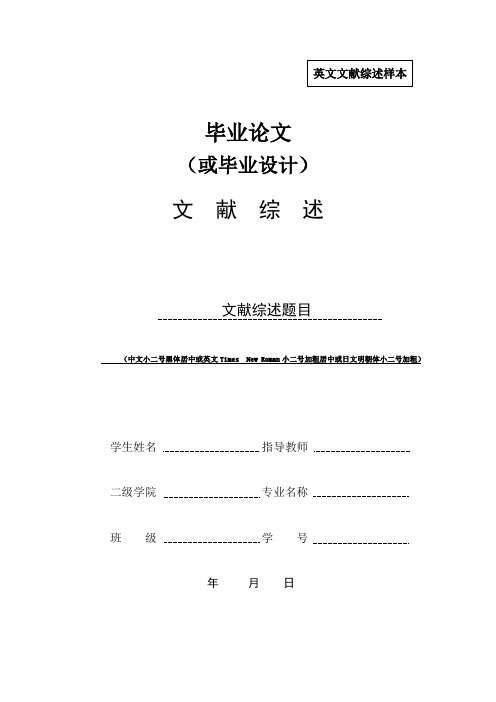
毕业论文(或毕业设计)文献综述文献综述题目(中文小二号黑体居中或英文Times New Roman小二号加粗居中或日文明朝体小二号加粗)学生姓名指导教师二级学院专业名称班级学号年月日(标题Times New Roman三号加粗)The Literature ReviewofThe Mystery of Antonio’s Sadness in The Merchant of Venice (正文用Times New Roman小四,1.5倍行距,各段首行空4个字符,书名用斜体加粗)Written sometime between 1596 and 1598, The Merchant of Venice is classified as both an early Shakespearean comedy (more specifically, as a "Christian comedy") and as one of the Bard's problem plays; it is a work in which good triumphs over evil, but serious themes are examined and some issues remain unresolved.In The Merchant of Venice , Shakespeare wove together two ancient folk tales, one involving a vengeful, greedy creditor trying to exact a pound of flesh, the other involving a marriage suitor's choice among three chests and thereby winning his (or her) mate. Shakespeare's treatment of the first standard plot scheme centers around the villain of Merchant, the Jewish moneylender Shylock, who seeks a literal pound of flesh from his Christian opposite, the generous, faithful Antonio. Shakespeare's version of the chest-choosing device revolves around the play's Christian heroine Portia, who steers her lover Bassanio toward the correct humble casket and then successfully defends his bosom friend Antonio from Shylock's horrid legal suit. Antonio, as the title character, is sad from the beginning to the end of the play but never names the cause of his melancholy even when his friends ask him. Antonio plays the role as an outcast in the play. Shakespeare uses Antonio’s sadness simply as the device to set the tragic tone in the comedy or make Antonio be one of his melancholic characters in his works? Or Antonio is the representative of the complicated human nature? Antonio's unexplained melancholy is a significant element in understanding the play.1. Studies on The Merchant of V enice(Times New Roman + 四号+首缩进4字符,下同)Karl Marx once cited that Shakespeare is the greatest playwright in the world.Shakespeare’s comedy The Merchant of Venice is one of the most influential comedies in his works. Shylock has mostly been the center of the research on the play.The Merchant of Venice was first printed in 1600 in quarto, of which nineteen copies survive. This was followed by a 1619 printing, and later an inclusion in the First Folio in 1623. The play was written shortly after Christopher Marlowe’s immensely popular Jew of Malta (1589), a play wherein a Jew named Barabas plays a greatly exaggerated villain. The portrayal of Shakespeare's Jew was and remained comic until the late 1700s at which time he was first played as a true villain. In 1814 Sh ylock’s role was depicted as a character to be pitied, and in 1879 he was first portrayed as a tragic character. Subsequent interpretations have varied greatly over the years, but since World War II he has most often been conceived of as tragic. The Merchant of Venice has been described as a great commentary on the nature of racial and religious interactions.2. Deficiencies of Previous Studies on the Mystery of Antonio’s Sadness in The Merchant of V eniceThe title character, Antonio, begins the play intriguingly: "In sooth, I know not why I am so sad; / It wearies me" (I.i.1-2). Much ink has been spilled with conjectures about Antonio's melancholy: that he's simply melancholic of temperament, that his devotion to Bassanio is homoerotic and the news that this friend seeks to marry has depressed him (Antonio is a name Shakespeare uses also in Twelfth Night for a character with an intense devotion to another male), or that he has an "ominous foreboding" about the events that will transpire in the course of this play. Although those pioneers aroused people to think much of The Merchant of Venice and left us invaluable and systematic reference, and made many achievements in description and explanation of the cause of Antonio’s sadness, there remain many deficienc ies.First, The Merchant of Venice,which is considered to be one of Shakespeare’s four great comedies, actually functions as Shakespeare's farewell to comedy. Antonio is one of Shakespeare’s melancholic characters. Shakespeare in The Merchant of Venice is undermining all that passes for comic entertainment. Shakespeare uses Antonio’ssadness as a device to set the tragic tone in the comic atmosphere.Second, a lot of issues that are argued about regarding The Merchant of Venice can be considerably clarified if we know something about the audience it was written for. In the modern, post-Holocaust readings of the play, the problem of anti-Semitism in the play has been discussed a lot. Given that Antonio decides not to seize Shylock’s goods as punishment, we might consider Antonio to be merciful. But we may also question whether it is merciful to return to Shylock half of his goods, only to take away his religion and his profession. Antonio’s compassion seems to stem as much from self-interest as from concern for his fellow man. Shakespeare thus shows a balance of prejudice on both sides. The question whether Antonio is a homosexual in love with Bassanio can also interpreted differently.5. ConclusionDespite the researches already done and achievements already made on the subject, many frontiers are still waiting to be explored. On the basis of the previous researches by forerunners and adopting new approaches we are to make a deeper and more comprehensive understanding of this subject. We don't mean to suggest that other ways of looking at the play are "wrong." In fact, one of the things that is so great about Shakespeare is that there are so many different ways of interpreting his plays that all work.References (Times New Roman四号加粗)参考文献不应少于10条,参考文献应按英文26个字母的顺序排列,先列外文文献后列中文文献,中文用宋体小四,外文用Times New Roman小四。
威尼斯商人启示英语精选作文
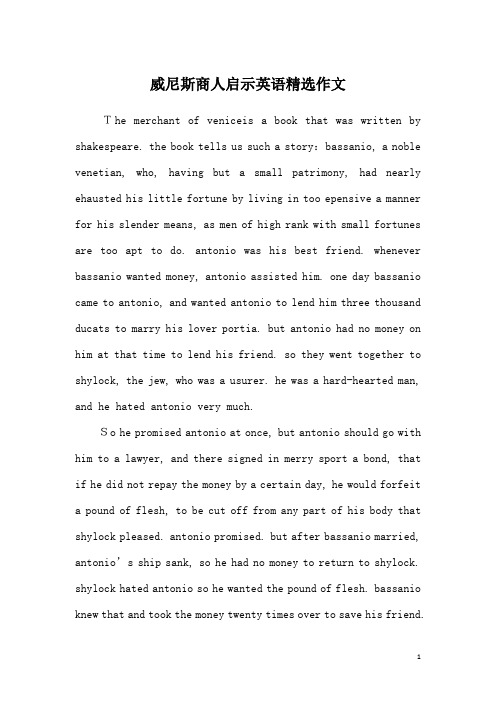
威尼斯商人启示英语精选作文The merchant of veniceis a book that was written by shakespeare. the book tells us such a story:bassanio, a noble venetian, who, having but a small patrimony, had nearly ehausted his little fortune by living in too epensive a manner for his slender means, as men of high rank with small fortunes are too apt to do. antonio was his best friend. whenever bassanio wanted money, antonio assisted him. one day bassanio came to antonio, and wanted antonio to lend him three thousand ducats to marry his lover portia. but antonio had no money on him at that time to lend his friend. so they went together to shylock, the jew, who was a usurer. he was a hard-hearted man, and he hated antonio very much.So he promised antonio at once, but antonio should go with him to a lawyer, and there signed in merry sport a bond, that if he did not repay the money by a certain day, he would forfeit a pound of flesh, to be cut off from any part of his body that shylock pleased. antonio promised. but after bassanio married, antonio’s ship sank, so he had no money to return to shylock. shylock hated antonio so he wanted the pound of flesh. bassanio knew that and took the money twenty times over to save his friend.but shylock only wanted to kill antonio. when there seemed to be no way to help antonio, portia came. she dressed herself as a man who was a lawyer. she contended with shylock on the law court. she persuaded shylock to accept the money but not the flesh. but shylock only wanted to kill antonio; he didn’t accept the money. at last portia found a rip in the agreement. so she saved antonio and shylock got punished.Shylock is a villain, and in our life, we sometimes can barge up against the man like shylock. maybe they want our money or something else. we do not want to come into contact with such men, but not everything is following our wills. if we come up against the villains, we can use our wit to beat them.First, when we find he is a villain, we must be calm and brave; we mustn’t be panic. we can speak to him and tell him you have no money, and we can make him think that we are weak or a little afraid. then he is relaed, we can call our relations or the police to help ourselves. or we even can call others for help. others may help us. on the other hand, if others need our help, we should do our best to help them. we must use our wit to fight against the villains.When we come up against the villains, we must believe that righteousness can always overcome improbity. if we know that,we can see others are helping us and we are helping others who need our help. we are together building a more clear and wonderful world.。
威尼斯商人-英语版的故事梗概
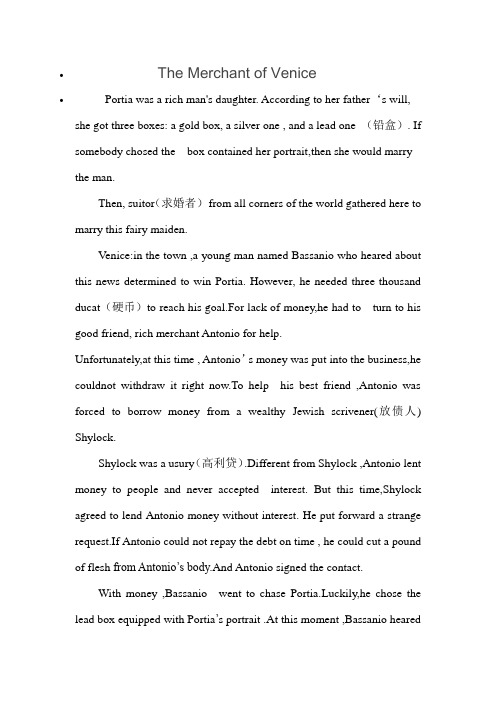
∙The Merchant of Venice∙Portia was a rich man's daughter. According to her father‘s will, she got three boxes: a gold box, a silver one , and a lead one (铅盒). If somebody chosed the box contained her portrait,then she would marry the man.Then, suitor(求婚者)from all corners of the world gathered here to marry this fairy maiden.Venice:in the town ,a young man named Bassanio who heared about this news determined to win Portia. However, he needed three thousand ducat(硬币)to reach his goal.For lack of money,he had to turn to his good friend, rich merchant Antonio for help.Unfortunately,at this time , Antonio’s money was put into the business,he couldnot withdraw it right now.To help his best friend ,Antonio was forced to borrow money from a wealthy Jewish scrivener(放债人) Shylock.Shylock was a usury(高利贷).Different from Shylock ,Antonio lent money to people and never accepted interest. But this time,Shylock agreed to lend Antonio money without interest. He put forward a strange request.If Antonio could not repay the debt on time , he could cut a pound of flesh from Antonio’s body.And Antonio signed the contact.With money ,Bassanio went to chase Portia.Luckily,he chose the lead box equipped with Portia’s portrait .At this moment ,Bassanio hearedabout Antonio ‘s lawsuit .So he hold a wedding ceremony in a hurry .Meanwhile, Portia maid, Narisa also accepted Bassanio’s maid proposal .Shylock's daughter, Jessica eloped at the help of Antonio and stoled her father's money and jewelry. So Shylock hated Antonio very much . When he learned that Antonio’s loss of offshore investment ,he decided to revenge .He sued Antonio.In court, Shylock asked Antonio to perform the contract.In other words ,Antonio must cut one pound of flesh from his own body .The judges had no clues to do with Shylock . At the last minute,a new judge disguised by Portia came to tackle the matter .According to the contract, Portia agreed Shylock to cut meat from Antonio,but he must master the weight,neither more nor less,just the right amount ,and he must promise cut without a drop of blood and Antonio’s life safety .Shylock couldn't do it and had to throw in the towel. In this way ,Portia skillfully save Antonio's life. Finally, everything was illuminated, Bassanio knew his wife was the great judge .He felt very thankful for Portia’s help and loved her much more .Antonio got his own property. Happy ending !。
威尼斯商人的英语赏析作文
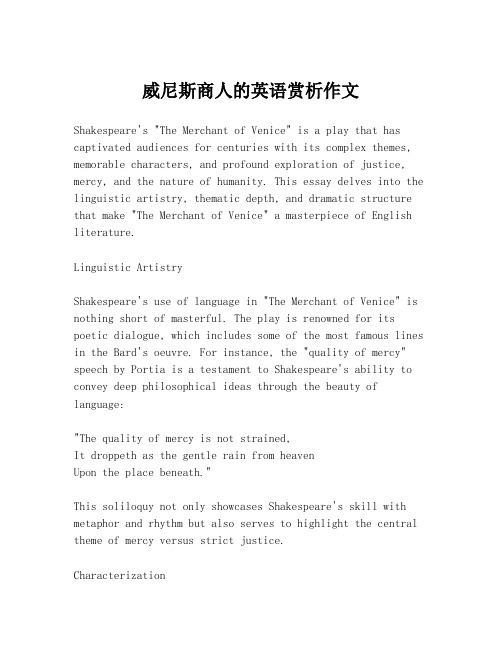
威尼斯商人的英语赏析作文Shakespeare's "The Merchant of Venice" is a play that has captivated audiences for centuries with its complex themes, memorable characters, and profound exploration of justice, mercy, and the nature of humanity. This essay delves into the linguistic artistry, thematic depth, and dramatic structure that make "The Merchant of Venice" a masterpiece of English literature.Linguistic ArtistryShakespeare's use of language in "The Merchant of Venice" is nothing short of masterful. The play is renowned for its poetic dialogue, which includes some of the most famous lines in the Bard's oeuvre. For instance, the "quality of mercy" speech by Portia is a testament to Shakespeare's ability to convey deep philosophical ideas through the beauty of language:"The quality of mercy is not strained,It droppeth as the gentle rain from heavenUpon the place beneath."This soliloquy not only showcases Shakespeare's skill with metaphor and rhythm but also serves to highlight the central theme of mercy versus strict justice.CharacterizationThe characters in "The Merchant of Venice" are vividly drawn and serve to explore the play's themes. Antonio, the merchant, is a melancholic figure whose mysterious sadness adds a layer of depth to the narrative. Bassanio, his friend, is the epitome of a Renaissance man, ambitious and seeking to rise above his station through marriage to a wealthy heiress. Portia, the heiress in question, is a character of wit and intelligence, who disguises herself as a legal advisor tosave Antonio, thus challenging the gender norms of the time.Shylock, the play's most controversial character, is a Jewish moneylender who has been the subject of much critical debate. His portrayal has been seen as both an example of anti-Semitic tropes and a complex character driven by theinjustices he has suffered. Shakespeare's ability to elicit empathy for Shylock, despite his villainous actions, is a testament to his nuanced approach to character development.Thematic DepthThe themes of "The Merchant of Venice" are multifaceted and continue to resonate with modern audiences. The play explores the nature of justice, the perils of prejudice, and the complexities of love and friendship. The bond between Antonio and Bassanio, the love story between Bassanio and Portia, and the legal battle between Shylock and Antonio all serve to examine these themes from different angles.The concept of justice is particularly central, with the play presenting a conflict between moral justice (the idea offairness and humanity) and legal justice (the strict adherence to law). The famous trial scene, where Shylock demands his bond of a pound of flesh, is a dramatic high point that forces the characters and the audience to confront the implications of strict legalism without compassion.Dramatic StructureThe structure of "The Merchant of Venice" is both intricate and effective in driving the narrative forward. The play is divided into several interconnected plots that serve to heighten the tension and develop the themes. The subplot involving the caskets of gold, silver, and lead adds a layer of suspense and parallels the main plot's exploration of risk and reward.The interplay between comedy and tragedy is anotherstructural feature that adds depth to the play. While the romantic entanglements and witty banter provide moments of levity, the darker elements of the play, such as Shylock's persecution and the threat to Antonio, create a sense of impending doom that keeps the audience engaged.In conclusion, "The Merchant of Venice" is a rich tapestry of language, character, theme, and structure that offers a profound exploration of human nature and society. Shakespeare's play remains a powerful piece of literaturethat continues to challenge and inspire readers and theater-goers alike. Its language is as poetic as it is precise, its characters are as flawed as they are relatable, and its themes are as complex as they are timeless.。
- 1、下载文档前请自行甄别文档内容的完整性,平台不提供额外的编辑、内容补充、找答案等附加服务。
- 2、"仅部分预览"的文档,不可在线预览部分如存在完整性等问题,可反馈申请退款(可完整预览的文档不适用该条件!)。
- 3、如文档侵犯您的权益,请联系客服反馈,我们会尽快为您处理(人工客服工作时间:9:00-18:30)。
毕业论文(或毕业设计)文献综述文献综述题目(中文小二号黑体居中或英文Times New Roman小二号加粗居中或日文明朝体小二号加粗)学生姓名指导教师二级学院专业名称班级学号年月日(标题Times New Roman三号加粗)The Literature ReviewofThe Mystery of Antonio’s Sadness in The Merchant of Venice (正文用Times New Roman小四,1.5倍行距,各段首行空4个字符,书名用斜体加粗)Written sometime between 1596 and 1598, The Merchant of Venice is classified as both an early Shakespearean comedy (more specifically, as a "Christian comedy") and as one of the Bard's problem plays; it is a work in which good triumphs over evil, but serious themes are examined and some issues remain unresolved.In The Merchant of Venice , Shakespeare wove together two ancient folk tales, one involving a vengeful, greedy creditor trying to exact a pound of flesh, the other involving a marriage suitor's choice among three chests and thereby winning his (or her) mate. Shakespeare's treatment of the first standard plot scheme centers around the villain of Merchant, the Jewish moneylender Shylock, who seeks a literal pound of flesh from his Christian opposite, the generous, faithful Antonio. Shakespeare's version of the chest-choosing device revolves around the play's Christian heroine Portia, who steers her lover Bassanio toward the correct humble casket and then successfully defends his bosom friend Antonio from Shylock's horrid legal suit. Antonio, as the title character, is sad from the beginning to the end of the play but never names the cause of his melancholy even when his friends ask him. Antonio plays the role as an outcast in the play. Shakespeare uses Antonio’s sadness simply as the device to set the tragic tone in the comedy or make Antonio be one of his melancholic characters in his works? Or Antonio is the representative of the complicated human nature? Antonio's unexplained melancholy is a significant element in understanding the play.1. Studies on The Merchant of V enice(Times New Roman + 四号+首缩进4字符,下同)Karl Marx once cited that Shakespeare is the greatest playwright in the world.Shakespeare’s comedy The Merchant of Venice is one of the most influential comedies in his works. Shylock has mostly been the center of the research on the play.The Merchant of Venice was first printed in 1600 in quarto, of which nineteen copies survive. This was followed by a 1619 printing, and later an inclusion in the First Folio in 1623. The play was written shortly after Christopher Marlowe’s immensely popular Jew of Malta (1589), a play wherein a Jew named Barabas plays a greatly exaggerated villain. The portrayal of Shakespeare's Jew was and remained comic until the late 1700s at which time he was first played as a true villain. In 1814 Sh ylock’s role was depicted as a character to be pitied, and in 1879 he was first portrayed as a tragic character. Subsequent interpretations have varied greatly over the years, but since World War II he has most often been conceived of as tragic. The Merchant of Venice has been described as a great commentary on the nature of racial and religious interactions.2. Deficiencies of Previous Studies on the Mystery of Antonio’s Sadness in The Merchant of V eniceThe title character, Antonio, begins the play intriguingly: "In sooth, I know not why I am so sad; / It wearies me" (I.i.1-2). Much ink has been spilled with conjectures about Antonio's melancholy: that he's simply melancholic of temperament, that his devotion to Bassanio is homoerotic and the news that this friend seeks to marry has depressed him (Antonio is a name Shakespeare uses also in Twelfth Night for a character with an intense devotion to another male), or that he has an "ominous foreboding" about the events that will transpire in the course of this play. Although those pioneers aroused people to think much of The Merchant of Venice and left us invaluable and systematic reference, and made many achievements in description and explanation of the cause of Antonio’s sadness, there remain many deficienc ies.First, The Merchant of Venice,which is considered to be one of Shakespeare’s four great comedies, actually functions as Shakespeare's farewell to comedy. Antonio is one of Shakespeare’s melancholic characters. Shakespeare in The Merchant of Venice is undermining all that passes for comic entertainment. Shakespeare uses Antonio’ssadness as a device to set the tragic tone in the comic atmosphere.Second, a lot of issues that are argued about regarding The Merchant of Venice can be considerably clarified if we know something about the audience it was written for. In the modern, post-Holocaust readings of the play, the problem of anti-Semitism in the play has been discussed a lot. Given that Antonio decides not to seize Shylock’s goods as punishment, we might consider Antonio to be merciful. But we may also question whether it is merciful to return to Shylock half of his goods, only to take away his religion and his profession. Antonio’s compassion seems to stem as much from self-interest as from concern for his fellow man. Shakespeare thus shows a balance of prejudice on both sides. The question whether Antonio is a homosexual in love with Bassanio can also interpreted differently.5. ConclusionDespite the researches already done and achievements already made on the subject, many frontiers are still waiting to be explored. On the basis of the previous researches by forerunners and adopting new approaches we are to make a deeper and more comprehensive understanding of this subject. We don't mean to suggest that other ways of looking at the play are "wrong." In fact, one of the things that is so great about Shakespeare is that there are so many different ways of interpreting his plays that all work.References (Times New Roman四号加粗)参考文献不应少于10条,参考文献应按英文26个字母的顺序排列,先列外文文献后列中文文献,中文用宋体小四,外文用Times New Roman小四。
